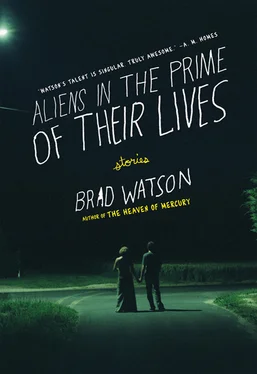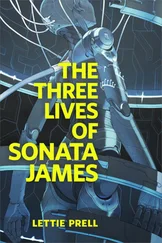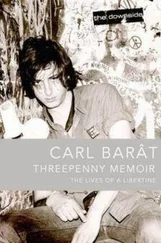ONE DAY HAL ASKED permission to go out with his new friend’s family on a charter fishing boat. They would have to leave very early, before dawn. I determined to rise then, too, and see him off. But I wasn’t able to, and no one woke me, so I didn’t get up until light was seeping into the sky over the Sound. I rushed outside onto the motel lawn, stood there barefoot in the dew and cool heavy breeze, and looked out across the water. On the horizon I could see the gray silhouette of a ship, a big ship, which in my memory’s surviving image appears to be a tanker of some kind, an oceangoing vessel. But at that moment, on the lawn, I thought it must be the boat Hal had gone on with his new friend and family — these people I’d never spoken to, whom I’d only watched from across the lawn, complete strangers to me and already fast friends with Hal. Watching the ghostly ship far out in the Sound, I had the strongest feeling that he’d gone away and would never return. It was something I couldn’t quit grasp, just yet, someone going so far out in the water on a boat that you can’t see them anymore, and then coming back in. I was very sad, I remember, thinking that he was gone forever. And I have lost the memory of his returning from the fishing trip to the motel. I’ve wondered why I felt so much sadder then than I did when he died. Anticipation is expansive in the imagination. Memory is reductive, selective. And any great moment must be too much to absorb in that moment, without the ameliorative power of genius or mental illness. When Hal died, years later, it seemed like the completion of something I’d been watching and waiting for all that time.
His last words, I was told, were a blurted, Look out!
My father’s last words, I was told, were, Something’s wrong.
If my mother had any last words, they are a secret, as she was old and alone. And if any words were formed in her mind as she lay unconscious and slowly dying on her bedroom floor, no one will ever know what they were.
IT’S HARD TO REMEMBER Hal in very specific ways. He was a small boy, and then a small man. I did not remember him that way, since he was four years older and so until I was into my later teens he was larger than me. I remember how shocking it was when, a couple of years after his death, I went into his room and tried on one of his shirts. It was tight across the shoulders, too short in the sleeves. This was shocking because I had thought he was at least as tall as I was and stockier, but he was not. He had always carried himself like a larger boy and man.
A second child will always feel displaced by the first. People say it’s the other way around but it’s not. Later in life there are the photographs you discover of your older sibling, before you were born, with one or both of your parents. It’s then, after you’ve had children yourself and know the experience in your own life, that you understand the bond between the new, young parents and their first child. You understand how miraculous and illuminating it is. You know how the experience has remade the whole world for the parents, and how the only child’s world, entirely new in the magnificent, solipsistic way only an only child’s world can be, eclipses all else, and when the second child comes along it is only as if the eclipsing body has moved aside, moved along in its path. The wonder has passed, leaving the washed and dazed sense of deep and cathartic change, an experience that will never be repeated for anyone in that little world. And, in truth, it leaves everyone feeling a little bit diminished. You realize this, when you are older and you have memories and these memories are informed, in a slow infusion of understanding, by the old photographs taken before you were even conceived.
Hal was a prodigy, in many ways a typical first child in that he was precocious, gregarious, fearless, bestowed at birth with the grandest, most natural sense of entitlement. Every first child is a king or queen. A prince or princess, an enfant terrible of privilege and favor. And Hal was talented. When he was three, he learned the words to the popular song “Davy Crockett, King of the Wild Frontier” and sang it so adorably that our parents secured a recording session for him down at a local radio station.
He was introduced by George Shannon, a local radio and television personality. I imagine Hal wearing his cowboy outfit, a black hat and black, sequined shirt, black pants, black, filigreed cowboy boots, a toy six-shooter in a toy holster on his belt. He probably wasn’t wearing this outfit, since it had nothing to do with Davy Crockett, but there’s a framed photo of Hal at about that age, wearing that outfit, that hung for decades on our mother’s living room wall, and so that’s how I see him, then. A musical cousin, Doc Taylor, strummed the song’s tune on a guitar, and Hal sang the song in his piping voice.
Born on a mountain top in Tennessee,
Greenest state in the land of the free.
Raised in the woods so’s he knowed every tree.
Kil’t him a b’ar when he was only three.
Davy, Daa vy Crock ett.
King of the weeld frontier.
I write “wild” that way because that was how he pronouced it, like some kind of flamboyant elf.
In the background on the recording, toward the end of the song, you can hear a baby crying a little fitfully, fussing. That was me, only a few weeks old, trying as would become usual to assert myself, to little avail.
This recording was of course a precious possession, always, but it became all the more so after Hal’s early death, when he was a young man only recently married. It disappeared after the accident, and my mother bitterly accused Hal’s widow of having taken it for herself. I took this for the truth. And then, many years later, after my mother’s death, I found it beneath a stack of papers and documents in a dresser drawer in her bedroom.
Well, no, said one of my cousins. It was never lost, not that I know of.
She never told you that Sophie had taken it?
No, my cousin said. She never said that to me.
I could have sworn she’d told me the recording was missing, stolen, possibly destroyed out of spite. But even the memory of her telling me that comes from so long ago, now, that I can no longer be sure.
OUT AT THE Alamo Plaza’s pool next day there were a few people, a woman with two toddlers down in the shallow end, a few grown-ups in loungers along the apron. The big fat man who’d been jumping and doing cannonballs the night before was again on the diving board, leisurely bouncing and looking around, as if this were simply his place. He bounced easily, the board bending beneath his great weight and riding him slow as an elevator back up again. His toes hung over the end, his arms hung at his sides, and he nodded to us as we walked up.
Across the highway the beach was empty. The Sound lay flat and brown in the sun’s glare.
Morning, he called out to our mother. She smiled and nodded back. Morning, sir, our father said in his clear baritone sales voice. From my spot at the three-foot mark, I called good morning to the man, too, and he called back with a little salute and a wave, Morning, young man.
Standing there bouncing.
A long, big-boned woman lying flat out on a lounger with a broad hat over her face called to him. The voice came from her, but you couldn’t see her face. The hat didn’t move. Harry, she said to the man. Don’t go splashing all over creation.
The man looked at her, still bouncing, then looked at me and smiled and winked. He walked back to the base end of the board and turned around.
Harry, the woman said.
The big man rose on his toes. It looked comical, the action of a much lighter, fitter man. He spread his arms like a ballerina, ran tiptoeing down to the end of the board, came down heavily, and the board slowly flung him up. He came down in a cannonball, leaning in the woman’s direction, and sent up a high sheet of water that drenched her pretty good. She sat up and adjusted the wet floppy hat on her head. Harry swam to the pool’s edge and grinned at Hal and me. I looked at our mother. She stared at the man and woman, her mouth cocked into a curious smile. She saw me looking and picked up a magazine and started reading it. Our father sat in a deck chair in his swim trunks, his elbows on his knees like a man watching a baseball game. A can of Jax beer rested on the concrete apron between his white feet.
Читать дальше












